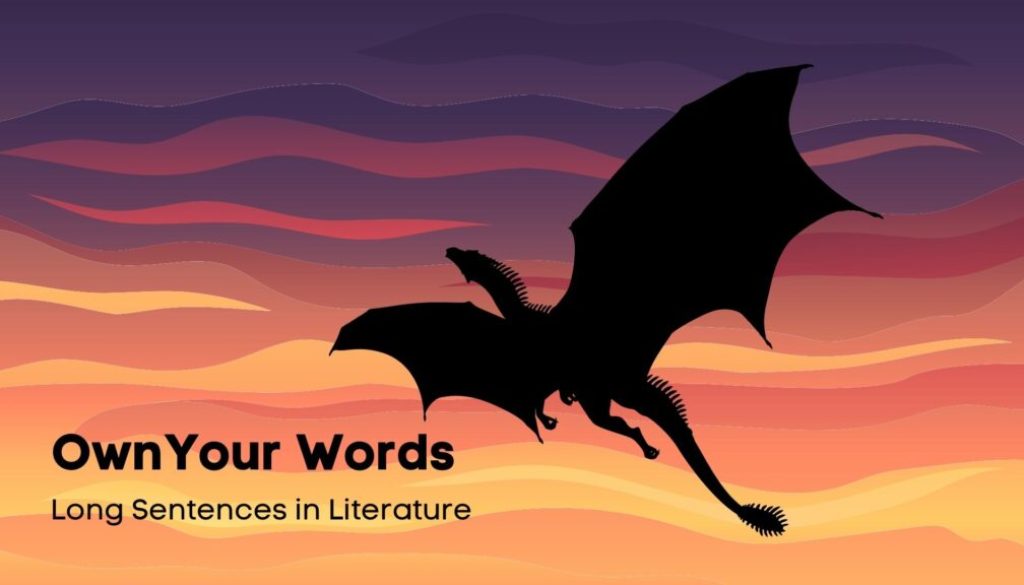Long Sentences in Literature
We have all read long sentences. Good writers know how to create sentences of any length, that’s why a good stories have sentences of varying length. Some even have incredibly long ones.
Remember…
Long sentences are wonderful. I like them. Short sentences please me too. It’s important to note, long sentences are not bad and short sentences are not better. On the other hand, short sentences are not bad and long sentences are not better. We all understand, some writers might forge long sentences for the sake of proving an ability to craft those types of sentences, thus using all the wit contained in the brain, combined with samples of a large lexicon, such wordsmiths are not always capable of making those tedious sentences enjoyable. Short is good.
A Sample of Long Sentences
For the sake of this post let’s say only long sentences are good, to get more familiar with how long sentences work, consider reading How to Write Great Sentences.
67 Words – The Chosen by Chaim Potok (1967)
The caps tapped against the stone of the steps, then against the stone of the top landing in front of the double door -and I remembered the old man I often saw walking along Lee Avenue, moving carefully through the busy street and tapping, tapping, his metal-capped cane, which served him for eyes he had lost in a First World War trench doing a German Gas attack.
105 Words – Robinson Crusoe by Daniel Defoe (1719)
I was born in the year 1632, in the city of York, of a good family, though not of that country, my father being a foreigner of Bremen, who settled first at Hull. He got a good estate by merchandise, and leaving off his trade, lived afterwards at York, from whence he had married my mother, whose relations were named Robinson, a very good family in that country, and from whom I was called Robinson Kreutznaer; but, by the usual corruption of words in England, we are now called—nay we call ourselves and write our name—Crusoe; and so my companions always called me.
107 Words – Stuart Little by E.B. White (1945)
In the loveliest town of all, where the houses were white and high and the elms trees were green and higher than the houses, where the front yards were wide and pleasant and the back yards were bushy and worth finding out about, where the streets sloped down to the stream and the stream flowed quietly under the bridge, where the lawns ended in orchards and the orchards ended in fields and the fields ended in pastures and the pastures climbed the hill and disappeared over the top toward the wonderful wide sky, in this loveliest of all towns Stuart stopped to get a drink of sarsaparilla.
Descriptions of Life
116 Words – Mrs. Dalloway by Virginia Woolf (1925)
It was not to them (not to Hugh, or Richard, or even to devoted Miss Brush) the liberator of the pent egotism, which is a strong martial woman, well nourished, well descended, of direct impulses, downright feelings, and little introspective power (broad and simple–why could not every one be broad and simple? she asked) feels rise within her, once youth is past, and must eject upon some object–it may be Emigration, it may be Emancipation; but whatever it be, this object round which the essence of her soul is daily secreted, becomes inevitably prismatic, lustrous, half looking glass, half precious stone; now carefully hidden in case people should sneer at it; now proudly displayed.
118 Words – That Evening Sun by William Faulkner (1931)
The streets are paved now, and the telephone and electric companies are cutting down more and more of the shade trees–the water oaks, the maples and locusts and elms–to make room for iron poles bearing clusters of bloated and ghostly and bloodless grapes, and we have a city laundry which makes the rounds on Monday morning, gathering the bundles of clothes into bright-colored, specially-made motor cars: the soiled wearing of a whole week now flees apparitionlike behind alert and irritable electric horns, with a long diminishing noise of rubber and asphalt like tearing silk, and even the Negro women who still take in white people’s washing after the old custom, fetch and deliver it in automobiles.
Are These Run-on or Long Sentences?
119 Words – A Tale of Two Cities by Charles Dickens (1859)
It was the best of times, it was the worst of times, it was the age of wisdom, it was the age of foolishness, it was the epoch of belief, it was the epoch of incredulity, it was the season of Light, it was the season of Darkness, it was the spring of hope, it was the winter of despair, we had everything before us, we had nothing before us, we were all going direct to Heaven, we were all going direct the other way—in short, the period was so far like the present period, that some of its noisiest authorities insisted on its being received, for good or for evil, in the superlative degree of comparison only.
123 Words – Anna Karenina by Leo Tolstoy (1877)
It is true that Alexei Alexandrovich vaguely sensed the levity and erroneousness of this notion of his faith, and he knew that when, without any thought that his forgiveness was the effect of a higher power, he had given himself to his spontaneous feeling, he had experienced greater happiness than when he thought every minute, as he did now, that Christ lived in his soul, and that by signing papers he was fulfilling His will, but it was necessary for him to think that way, it was so necessary for him in his humiliation to possess at least an invented loftiness from which he, despised by everyone, could despise others, that he clung to his imaginary salvation as if it were salvation indeed.
Perfectly Formed Long Sentences
127 Words – The Jazz Age by F. Scott Fitzgerald (1922)
Sometimes, though, there is a ghostly rumble among the drums, an asthmatic whisper in the trombones that swings me back into the early twenties when we drank wood alcohol and every day in every way grew better and better, and there was a first abortive shortening of the skirts, and girls all looked alike in sweater dresses, and people you didn’t want to know said ‘Yes, we have no bananas’, and it seemed only a question of a few years before the older people would step aside and let the world be run by those who saw things as they were and it all seems rosy and romantic to us who were young then, because we will never feel quite so intensely about our surroundings any more.
128 Words – Robinson Crusoe by Daniel Defoe (1719)
He told me it was men of desperate fortunes on one hand, or of aspiring, superior fortunes on the other, who went abroad upon adventures, to rise by enterprise, and make themselves famous in undertakings of a nature out of the common road; that these things were all either too far above me or too far below me; that mine was the middle state, or what might be called the upper station of low life, which he had found, by long experience, was the best state in the world, the most suited to human happiness, not exposed to the miseries and hardships, the labour and sufferings of the mechanic part of mankind, and not embarrassed with the pride, luxury, ambition, and envy of the upper part of mankind.
Unbelievably Long Sentences
180 Words – Emma by Ane Austen (1815)
The charming Augusta Hawkins, in addition to all the usual advantages of perfect beauty and merit, was in possession of an independent fortune, of so many thousands as would always be called ten; a point of some dignity, as well as some convenience: the story told well; he had not thrown himself away — he had gained a woman of ten thousand pounds, or thereabouts; and he had gained her with such delightful rapidity — the first hour of introduction had been so very soon followed by distinguishing notice; the history which he had to give Mrs. Cole of the rise and progress of the affair was so glorious — the steps so quick, from the accidental rencontre, to the dinner at Mr. Green’s, and the party at Mrs. Brown’s — smiles and blushes rising in importance — with consciousness and agitation richly scattered — the lady had been so easily impressed — so sweetly disposed — had in short, to use a most intelligible phrase, been so very ready to have him, that vanity and prudence were equally contented.
What? Bordering on Confusion
216 Words – Barnaby Rudge by Charles Dickens (1841)
There he sat, watching his wife as she decorated the room with flowers for the greater honour of Dolly and Joseph Willet, who had gone out walking, and for whom the tea-kettle had been singing gaily on the hob full twenty minutes, chirping as never kettle chirped before; for whom the best service of real undoubted china, patterned with divers round-faced mandarins holding up broad umbrellas, was now displayed in all its glory; to tempt whose appetites a clear, transparent, juicy ham, garnished with cool green lettuce-leaves and fragrant cucumber, reposed upon a shady table, covered with a snow-white cloth; for whose delight, preserves and jams, crisp cakes and other pastry, short to eat, with cunning twists, and cottage loaves, and rolls of bread both white and brown, were all set forth in rich profusion; in whose youth Mrs V. herself had grown quite young, and stood there in a gown of red and white: symmetrical in figure, buxom in bodice, ruddy in cheek and lip, faultless in ankle, laughing in face and mood, in all respects delicious to behold—there sat the locksmith among all and every these delights, the sun that shone upon them all: the centre of the system: the source of light, heat, life, and frank enjoyment in the bright household world.
280 Words – The House Of The Seven Gables by Nathaniel Hawthorne (1851)
The purity of his judicial character, while on the bench; the faithfulness of his public service in subsequent capacities; his devotedness to his party, and the rigid consistency with which he had adhered to its principles, or, at all events, kept pace with its organized movements; his remarkable zeal as president of a Bible society; his unimpeachable integrity as treasurer of a widow’s and orphan’s fund; his benefits to horticulture, by producing two much-esteemed varieties of the pear, and to agriculture, through the agency of the famous Pyncheon-bull; the cleanliness of his moral deportment, for a great many years past; the severity with which he had frowned upon, and finally cast off, an expensive and dissipated son, delaying forgiveness until within the final quarter of an hour of the young man’s life; his prayers at morning and eventide, and graces at meal-time; his efforts in furtherance of the temperance cause; his confining himself, since the last attack of the gout, to five diurnal glasses of old sherry wine; the snowy whiteness of his linen, the polish of his boots, the handsomeness of his gold-headed cane, the square and roomy fashion of his coat, and the fineness of its material, and, in general, the studied propriety of his dress and equipment; the scrupulousness with which he paid public notice, in the street, by a bow, a lifting of the hat, a nod, or a motion of the hand, to all and sundry his acquaintances, rich or poor; the smile of broad benevolence wherewith he made it a point to gladden the whole world;–what room could possibly be found for darker traits, in a portrait made up of lineaments like these?
More Recent Long Sentences
310 Words – A Letter From Birmingham Jail by Martin Luther King (1963)
But when you have seen vicious mobs lynch your mothers and fathers at will and drown your sisters and brothers at whim; when you have seen hate-filled policemen curse, kick and even kill your black brothers and sisters; when you see the vast majority of your twenty million Negro brothers smothering in an airtight cage of poverty in the midst of an affluent society; when you suddenly find your tongue twisted and your speech stammering as you seek to explain to your six-year-old daughter why she can’t go to the public amusement park that has just been advertised on television, and see tears welling up in her eyes when she is told that Funtown is closed to colored children, and see ominous clouds of inferiority beginning to form in her little mental sky, and see her beginning to distort her personality by developing an unconscious bitterness toward white people; when you have to concoct an answer for a five-year-old son who is asking: Daddy, why do white people treat colored people so mean?; when you take a cross-country drive and find it necessary to sleep night after night in the uncomfortable corners of your automobile because no motel will accept you; when you are humiliated day in and day out by nagging signs reading white and colored; when your first name becomes nigger, your middle name becomes boy (however old you are) and your last name becomes John, and your wife and mother are never given the respected title Mrs.; when you are harried by day and haunted by night by the fact that you are a Negro, living constantly at tiptoe stance, never quite knowing what to expect next, and are plagued with inner fears and outer resentments; when you go forever fighting a degenerating sense of nobodiness–then you will understand why we find it difficult to wait.
From Fiction…
318 Words – Native Son by Richard Wright (1940)
It sounded suddenly directly above his head and when he looked it was not there but went on tolling and with each passing moment he felt an urgent need to run and hide as though the bell were sounding a warning and he stood on a street corner in a red glare of light like that which came from the furnace and he had a big package in his arms so wet and slippery and heavy that he could scarcely hold onto it and he wanted to know what was in the package and he stopped near an alley corner and unwrapped in and the paper fell away and he saw—it was his own head—his own head lying with black face and half-closed eyes and lips parted with white teeth showing and hair wet with blood and the red glare grew brighter like light shining down from a red moon and red stars on a hot summer night and he was sweating and breathless from running and the bell clanged so loud that he could hear the iron tongue clapping against the metal sides each time it swung to and fro and he was running over a street paved with black coal and his shoes kicked tiny lumps rattling against tin cans and he knew that very soon he had to find some place to hide but there was no place and in front of him white people were coming to ask about the head from which the newspapers had fallen and which was now slippery with blood in his naked hands and he gave up and stood in the middle of the street in the red darkness and cursed the booming bell and the white people and felt that he did not give a damn what happened to him and when the people closed in he hurled the bloody head squarely into their faces dongdongdong….
Do You Like Long Sentences?
I’m not a huge fan of excessively long sentences, but I love medium, somewhat long sentences. The most important thing to remember is that a long sentence should NOT be a run-on sentence.




